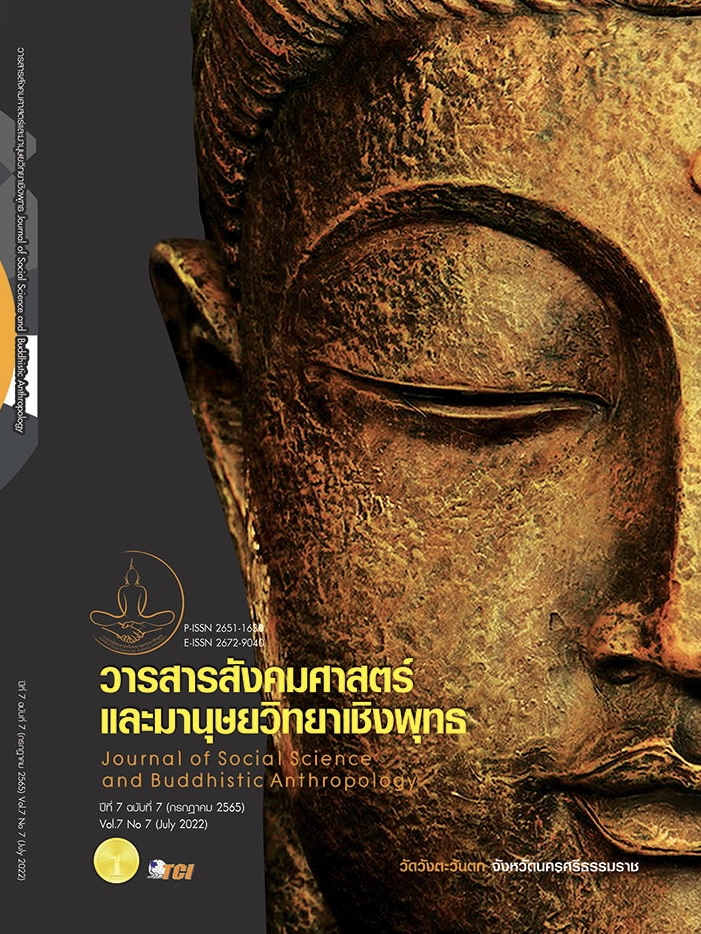THE MODEL OF PRIVATE SCHOOL ADMINISTRATION FOR CORPORATE SOCIAL RESPONSIBILITY IN THAILAND 4.0
Keywords:
Model of Private School Administration, Corporate Social Responsibility, Thailand 4.0Abstract
The Objectives of this research article were to 1) study the current condition, problems and guidelines for private school administration for corporate social responsibility in Thailand 4.0 era and 2) propose a model of private school administration for corporate social responsibility in Thailand 4.0 era. This study used a mixed research method. The population of this research included private schools of general education across the country, divided into 2 stages. 1) In-depth interviews with administrators, teachers and committees from 6 private schools that have been established for more than 10 years. 2) Inquiring with 700 administrators and teachers from 350 schools. Data were analyzed using descriptive statistics. The results of the research indicated that 1) private schools had a current state of corporate social responsibility by inserting them into activities both inside and outside the classroom as well as providing knowledge and resources to the community. As for the problem, it consisted of unclear approaches to organizing activities, the teacher's workload, Insufficient budget, limited space. As for the management approach, it should develop learning that emphasizes science, life skills, vocational skills, environment, and attention to learners. 2) The model of private school management consists of 2.1) principles of corporate social responsibility, good governance, equality, sufficiency economy, strategic management. 2.2) Concept of being a science school, digital school, green school, community school, happy school. 2.3) Components include management policy, curriculum, environmental education, personnel, community network 2.4) Highlights are that it can be used in all schools and can be combined with the original workload, can afford less capital, development of new skills. 2.5) Limitations include student availability, limited study time, equipment shortage 2.6) Conditions for success include policy making, engagement, lifelong learning, focusing on technology skills, community collaboration, and contextual deployment.
References
คณิภา ธุระธรรม. (2555). โรงเรียนชุมชน. เรียกใช้เมื่อ 10 ตุลาคม 2564 จาก https:// guru.sanook.com/7586/
จิรพันธุ์ จรัสภัทรโรจน์ เเละคณะ. (2560). ลักษณะทางประชากรและสังคมของบุคคลที่เสี่ยงต่อวงจรอุบาทว์ “โง่-จน-เจ็บ”: ข้อค้นพบจากการสำารวจอนามัยและสวัสดิการ พ.ศ. 2558. วารสารวิจัยระบบสาธารณสุข, 11(2), 195-204.
เยาวพา เดชะคุปต์. (2553). การพัฒนารูปแบบพหุปัญญาเพื่อการเรียนรู้สำหรับการจัดการศึกษาในบริบทของสังคมไทย. วารสารศรีนครินทรวิโรฒวิจัยและพัฒนา, 2(1), 133-145.
รัตนชัย ศรสุวรรณ. (2557). การบูรณาการความรับผิดชอบต่อสังคมของโรงเรียนมัธยมศึกษา สังกัดสำนักงานคณะกรรมการการศึกษาขั้นพื้นฐาน. ใน ดุษฎีนิพนธ์หลักสูตรปรัชญาดุษฎีบัณฑิต สาขาวิชาการบริหารการศึกษา. มหาวิทยาลัยศิลปากร.
วิชาญ สุวรรณวงศ์. (2549). การจัดการสิ่งแวดล้อมในโรงเรียนเบญจมราชรังสฤษฎิ์ 2 ตามการรับรู้ของครู. ใน วิทยานิพนธ์ศึกษาศาสตรมหาบัณฑิต สาขาการบริหารการศึกษา. มหาวิทยาลัยบูรพา.
สลิลรัตน์ พลอยประดับ. (2561). รูปแบบการบริหารเชิงกลยุทธ์สำหรับเสริมสร้างศักยภาพทางการแข่งขันของโรงเรียนเอกชนระดับมัธยมศึกษาในเขตภาคตะวันออก. ใน ดุษฎีนิพนธ์ปรัชญาดุษฎีบัณฑิต สาขาวิชาการบริหารการศึกษา. มหาวิทยาลัยบูรพา.
สำนักงานคณะกรรมการการศึกษาขั้นพื้นฐาน. (2562). แนวทางการนิเทศเพื่อพัฒนาและส่งเสริมการจัดการเรียนรู้เชิงรุก (Active Learning) ตามนโยบายลดเวลาเรียนเพิ่มเวลารู้. กรุงเทพมหานคร: หน่วยศึกษานิเทศก์ สำนักงานคณะกรรมการการศึกษาขั้นพื้นฐาน.
สำนักงานปลัดกระทรวงศึกษาธิการ. (2559). แผนพัฒนาการศึกษาของกระทรวงศึกษาธิการ ฉบับที่ 12 (พ.ศ.2560-2564). กรุงเทพมหานคร: ผู้แต่ง.
สุวณี อึ่งวรากร. (2557). การพัฒนาคุณภาพการศึกษาสู่โรงเรียนวิทยาศาสตร์ : กรณีศึกษาโรงเรียนจุฬาภรณราชวิทยาลัย ตรัง. ฐานข้อมูลงานวิจัยทางการศึกษา สำนักงานเลขาธิการสภาการศึกษา. เรียกใช้เมื่อ 12 ตุลาคม 2564 จาก http://www. thaiedresearch
สุวิทย์ เมษินทรีย์. (2558). ‘โมเดลประเทศไทย 4.0’ ผลึกความคิด (31 สิงหาคม 2558). เรียกใช้เมื่อ 26 มกราคม 2562 จาก http://www.thansettakij.com/content /9309
Downloads
Published
How to Cite
Issue
Section
License
Copyright (c) 2022 Journal of Social Science and Buddhistic Anthropology

This work is licensed under a Creative Commons Attribution-NonCommercial-NoDerivatives 4.0 International License.









